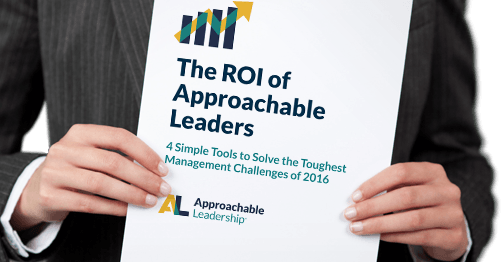[youtube https://www.youtube.com/watch?v=lmyZMtPVodo]
Good leaders make you feel safe, but there’s a difference between good leaders and most leaders.
You’ve probably seen this TED Talk before. It’s been viewed millions of times. If you haven’t seen it before check it out – you won’t regret it.
Sinek’s main point is that good leaders make you feel safe. This is a core principle of Approachable Leadership.
There’s a difference between good leaders and most leaders. Most leaders make their employees scared. This is usually not on purpose. But it still happens.
We each relate to power differently. Anytime there is a power relationship in play (and there is almost ALWAYS some sort of power relationship in play) we tend to act different than when we are with a peer. Some of us have very little concern with people in power and treat them mostly as peers. Most of us are more concerned about power, and treat people in power positions with more deference. This describes something called “power distance.”
The reason we defer to more powerful people often boils down to fear and loss of control. Powerful people can make stuff happen to us. In a work setting it could mean making us do something we don’t like, taking away something we do like, or in the worst case taking away our livelihood completely. Power distance, then, measures how scared we are of people in power. If we have low power distance (or a small power distance gap) we feel less fear. If we have wide power distance we have more fear.
This power distance works at a very primal level. For most of us when the boss approaches, our flight-or-fight reflexes immediately kick in. Our blood pressure rises and adrenaline pumps through our bodies. If we think we are in trouble or there is a problem it’s even worse. This is why Sinek believes the key job of a leader is to make us feel safe.
Sinek believes there are two key qualities of the best organizations—trust and cooperation. But this is the opposite of most companies. Most companies foster an environment where the individual feels like she has to look out for herself. Sinek states:
“In the military, they give medals to people who are willing to sacrifice themselves so others may gain. In business, we give bonuses to people who are willing to sacrifice others so that we may gain.”
There is a key difference between these two environments. In one the people focus energy and effort on protecting themselves from each other. The other encourages people to combine their talents and strengths to face the dangers outside and to seize opportunity. He goes on to say:
“The only variable [we have control of] are the conditions inside the organization and that’s where leadership matters because it’s the leader that sets the tone. When the leader makes the choice to put the safety and lives of the people inside the organization first, to sacrifice their comforts and sacrifice the tangible results so that the people remain and feel safe and feel like they belong, remarkable things happen.”
Sinek is talking about reducing power distance. Reducing power distance makes you feel safe.
Sinek suggests that trust and cooperation are the keys to unlocking your company’s potential. While this is great advice, even Sinek acknowledges it isn’t all that actionable. “The problem with concepts of trust and cooperation is that they are feelings. They are not instructions,” Sinek says. When you tell a leader that they need to be more trustworthy or they need to get their team to cooperate more you get a blank stare. Or defensiveness—”What do you mean I’m not trustworthy?”
You can’t force your employees to trust you. Nor can you force them to cooperate. How can you actually implement this advice? That’s where approachability comes in.
Over the next few months we will share some exciting new research that explains how teaching good leaders the simple, practical basics of approachability lays the foundation for a trust-based and cooperative organization.
What do you think about Sinek’s Talk? Do you agree or disagree that trust and cooperation are essential to creating a work environment that thrives, innovates, and lasts? Do you think good leaders are the ones who make you feel safe?











